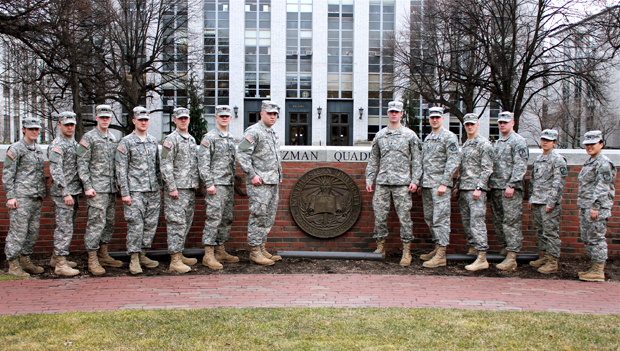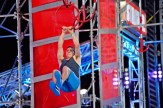Northeastern’s ROTC program honored with MacArthur Award

This marks the first time Liberty Battalion, the largest ROTC program in Massachusetts, has been recognized with the prestigious MacArthur Award. Above, Northeastern’s ROTC seniors are seen on Krentzman Quad.
The Army’s Reserve Officer Training Corps (ROTC) at Northeastern University has received a MacArthur Award for the 2010-11 academic year, the first time it has earned the prestigious honor.
MacArthur Awards are presented annually by the U.S. Army Cadet Command and the Gen. Douglas MacArthur Foundation, and recognize the ideals of, “duty, honor and country” as advocated by MacArthur. Awards are given to one battalion in each of the eight brigades nationwide that collectively comprise 273 ROTC programs.
Liberty Battalion, the largest ROTC program in Massachusetts, represents the 2nd Brigade consisting of the 41 senior Army ROTC battalions in the Northeast. Liberty Battalion is primarily based at Northeastern and includes cadets from area schools such as Boston College, Suffolk University, the Wentworth Institute of Technology, Simmons College, UMass Boston and the Berklee College of Music.
The awards are based on the program’s achievement of the school’s commissioning mission, its cadets’ performance and standing on the command’s National Order of Merit List and the program’s cadet retention rate.
The National Order of Merit List (OML) ranks cadets based on grade point average, performance at the Leadership Development and Assessment Course the summer before cadets’ senior year, observations made by cadre, land navigation and physical fitness. In Liberty Battalion this year, 10 of the 33 seniors were Distinguished Military Graduates, ranking in the top 20 percent of the OML.
Lt. Col. Gary Soldato and Master Sgt. Robby Jenkins, who both joined Northeastern in 2009, said the self-perpetuating leadership structure they implemented has led to Liberty Battalion’s success.
“We’re now reaping the benefits of what we’ve sown,” Jenkins said. “We’ve got our best practices, a strong cadre and staff, and these cadets have really brought something special to the program this year.”
“Seniors are tasked with the leadership to run the program and to show the juniors how to run the program,” Soldato said. “Each new senior class steps up to coordinate the program, using the skills they have learned from previous classes and building on their leadership.”
Anthony Chiccarelli, a senior cadet at Northeastern, said, “The point of this is to prepare us to be officers in the United States Army by giving us this level of responsibility for planning and execution of military exercises and training.”
Part of the leadership model implemented involves a mentoring component that helps new ROTC members learn how to balance the academic rigors of school and the leadership responsibilities expected of cadets.
“New people are brought into the group, with upperclassmen providing counsel and mentoring, giving us continued exposure and commitment to these expectations over time,” said cadet Daniel McSweeney, a senior.
The award underscores Northeastern’s commitment to its ROTC program and to the university’s student veterans. Defense and homeland security are also key components of the Northeastern’s research agenda.
Since 1950, the university has hosted a ROTC program on campus. At one time it was one of the largest completely volunteer ROTC units in the country, with about 2,800 cadets enrolled.





